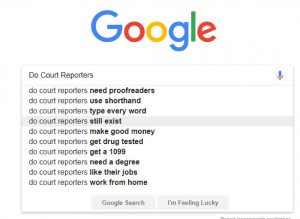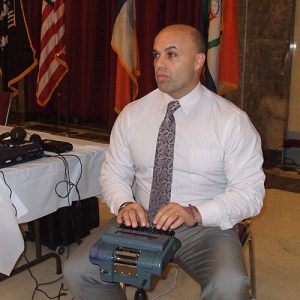By Dee Wright
The following is a recent article featuring an interview with MGR Reporting CEO Marc Russo.
It’s ironic that, with the ongoing evolution of all things digital and the job losses that technology is driving, many industries are facing unprecedented labor shortages. One reason for this is, while younger generations have been encouraged to become college-educated workers, they are overlooking potentially rewarding careers in skilled trades, ranging from construction and plumbing to nursing and court stenography.
 These fields require specific skills and talents, which may or may not include a working knowledge of the latest technology. They also demand integrity, critical thinking, and an impeccable work ethic. Automation will never replace these valuable human traits.
These fields require specific skills and talents, which may or may not include a working knowledge of the latest technology. They also demand integrity, critical thinking, and an impeccable work ethic. Automation will never replace these valuable human traits.
This has been an ongoing argument in the field of court reporting, with one side predicting total digital domination. But, fear not, stenographers won’t be going the way of elevator operators any time soon. As one of the oldest professions—dating back to the ancient scribes—stenographers have continuously adapted to change. Digital recording and videography are used by modern stenographers daily. But, experienced court reporters know that the unique human skills they bring to the job can’t be duplicated by a machine.
Unfortunately, a large segment of the court stenography talent pool will be leaving the workforce in the next 20 years and probably won’t be replaced. According to the National Court Reporters Association, the average stenographer is around 54 years old and there are not enough new trainees entering the field to replace them. Regionally, the shortages vary. Some stenographic trade schools are facing a high demand, while others are closing their doors.
Is it realistic to think stenographers could ever be replaced by machines? Probably not the entire profession, but we humans know that change is the only constant in life. We adapt.

Recently, I had an opportunity to interview Marc Russo, MGR Reporting CEO and Chief Court Reporter. Marc has led the New York firm since 2006 and he has more than two decades of experience in court reporting. Under his leadership, MGR Reporting has provided reporting services for many high-profile cases, always delivering on its commitment to high-quality, reliable, accurate and timely reporting.
Dee: You’ve been in the court reporting business for about 25 years. How did you get started?
Marc: Well, before this I was in hotel and restaurant management for several years, working long hours and on holidays and weekends and was looking to get into a more white-collar job. A friend showed me the steno machine and soon after that, I went to an open house about court reporting and enrolled in Stenotype Academy in New York.
It so happened my sister was looking for a profession as well and, ironically, we both attended the same school! She graduated first. I’m proud to say she’s been working as a New York State employee court reporter in criminal court for almost 18 years and was recently promoted to Supreme Court!
Thinking back to your first stenography assignment, what is most memorable?
Although confident, just how nervous I was. ‘Do the attorneys and witnesses know this is my FIRST assignment?’ Conversely, the feeling of euphoria when the job was over with all things going well.
Is the court reporter really the most important person in the room?
Yes. Court reporting is a unique skill. When you’re on the job, it’s your job to accurately record everything that is said between parties. That’s not easy. We’re not robots and people don’t speak so perfectly that it’s easy to get everything on the record. How could I compare it? It’s like playing the piano at Carnegie Hall and you can’t mess up any of the notes because everyone will know!
I would imagine it takes a certain personality type to be a successful court reporter. What do you think gives you the edge?
Well, yes. Personality type yes, but I think also how you function as a person in general. I always like to keep an even keel, and you need to in this profession. Also, you have to be a good listener, always looking to learn more about the profession, the English language, and current trends in grammar.
Here at MGR Reporting, we tell the reporters that you need to be organized, detailed-oriented, and able to adapt to new technology. In the beginning of your career, always be sure you have a system in place whereby someone is critiquing your work, so you can make improvements. I’ve seen long-time reporters hand in work which is a bit subpar and they probably never got the proper critiquing of their work through the years.
MGR makes sure all reporters, new or experienced, have their work reviewed. The younger reporters may take more time to mentor and help, but that was done for me in my early career and here at MGR I’ve carried that over. We take pride in the work product we put out.
Aside from the obvious technological advances, how has the field changed in the past 25 years?
Well, in some sense, not that much. I think this business was always considered recession-proof because litigation is always there, but dips in the economy here and there can affect the industry. One thing that is changing is there is a predicted shortage of stenographers since the baby boom generation is set to retire.
Even with the predicted shortages, court reporting remains a competitive field, especially in the New York area. What does MGR Reporting offer that other agencies don’t?
I can say we offer highly-personalized service. We stay on top of our clients’ needs and provide consistently high-quality customer service.
Do you serve a specific niche?
I would say our niche is reporting on public hearings. Time and again, we’re called on to transcribe some of the most promiment projects/initiatives in the NYC and Long Island region – from the West Side Stadium project in 2004 to the Rikers Island Hearings last year.
What is one of your most interesting high-profile jobs?
MGR Reporting was hired to transcribe some public hearings in New York City regarding the closing of Rikers Island and the City’s plan to build new facilities. The hearings were highly contentious, with many passionate public speakers.
There were four meetings held, lasting 3-5 hours each. It was a difficult environment to make a record, but I was able to persevere. My years of experience have taught me to hyperfocus, tune out extraneous noise, and concentrate on whoever is speaking. I was also able to give the client tips on managing raucous crowds at public meetings.
It sounds like stenography can be a challenging and rewarding career. What do you love most about it?
Your job never gets stagnant. You’re always refining your professional skills – keyboarding, grammar, technology, the English language.
There’s a saying about the fly on the wall; some of the conversations we’re privy to make you feel like that proverbial fly on the wall. At the same time, I feel like I’m involved in current events and playing a unique part in the changes that are happening.
What advice would you give to someone considering a career as a stenographer?
If you are a self-motivated person with a burning desire to improve your skills, this is the field. There are so many avenues available to you as you progress in your career. Being good with words and grammar and being able to sit and listen for long periods of time is a must if you want to succeed.
In closing, it looks like court reporters and stenographers will be around for a long time. It would be an excellent career choice for someone with the right skills. Honing those skills would allow for complete self-direction and autonomy in career growth, which is why many experienced stenographers enjoy the freedom of the entrepreneurial path. Perhaps they can guide us all as we embrace the digital revolution; melding traditional human skills with advanced technology and transforming the best of both worlds.
About the Writer:
Dee Wright is a freelance web designer, content specialist, blogger, and all-around communications guru. With Tangerine Web Works, she feeds her voracious appetite for words, images, and telling stories with beautiful websites. She helps small businesses and non-profit organizations thrive online and loves writing informative articles about unique entrepreneurs and the industries they serve.


